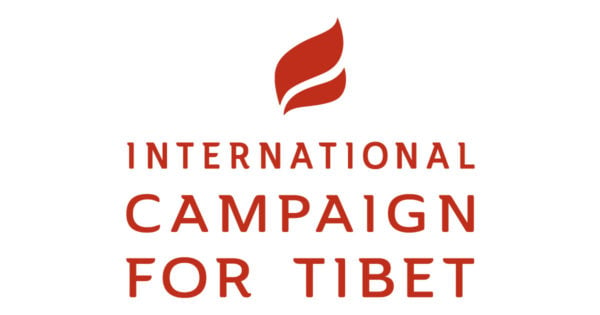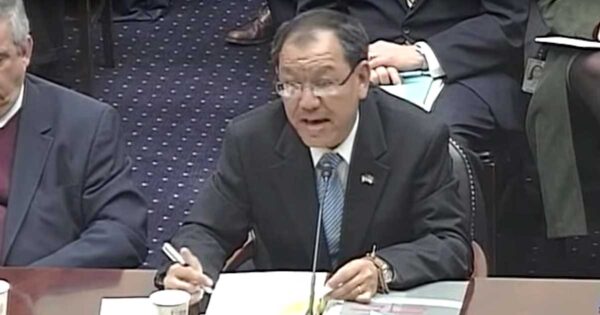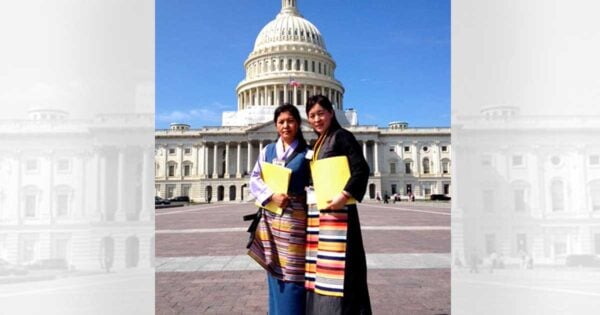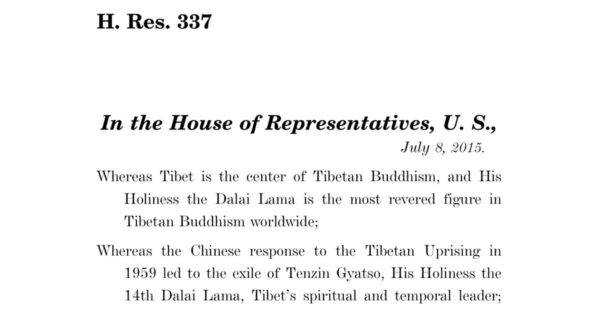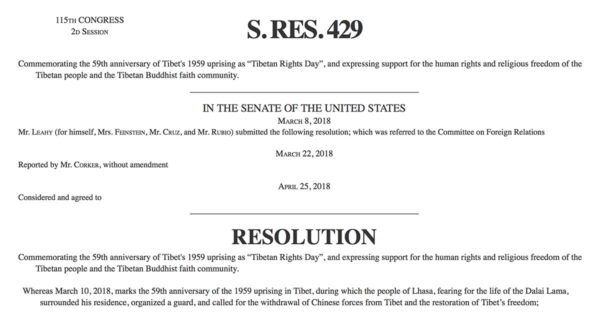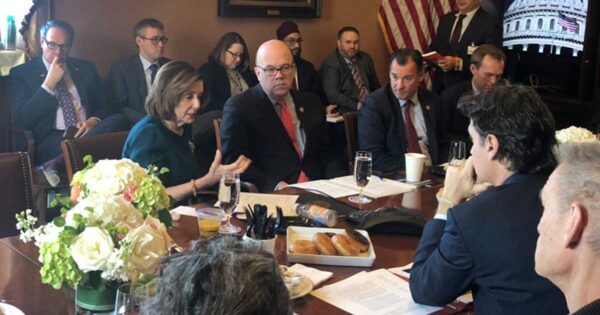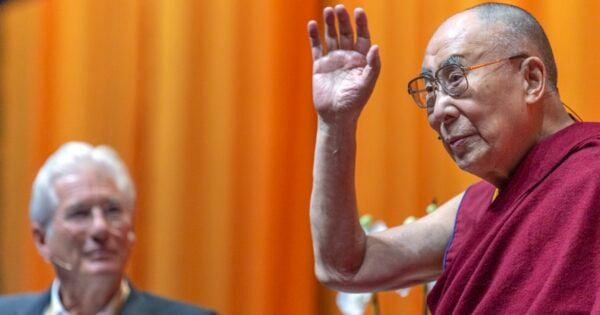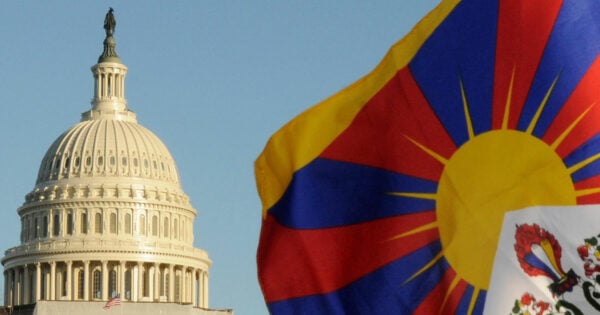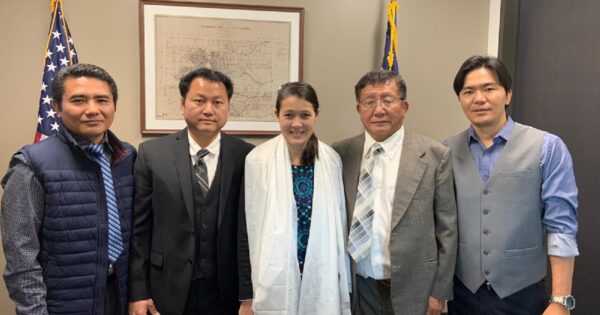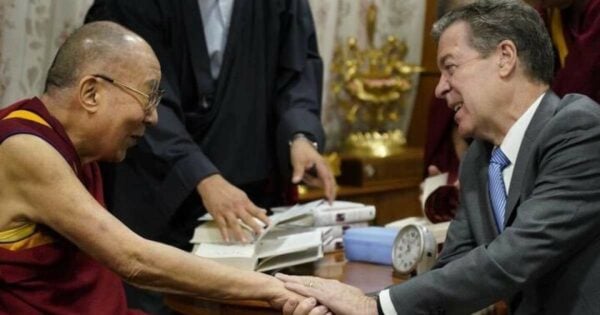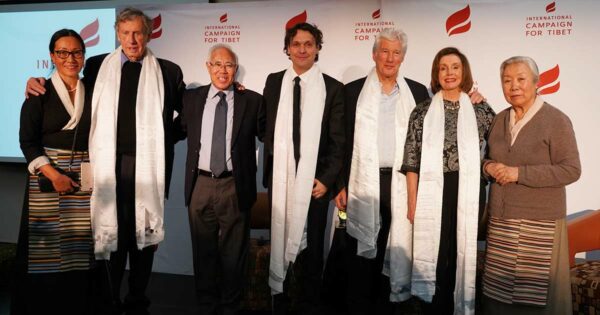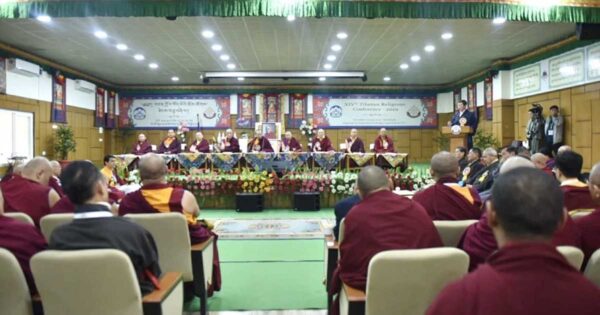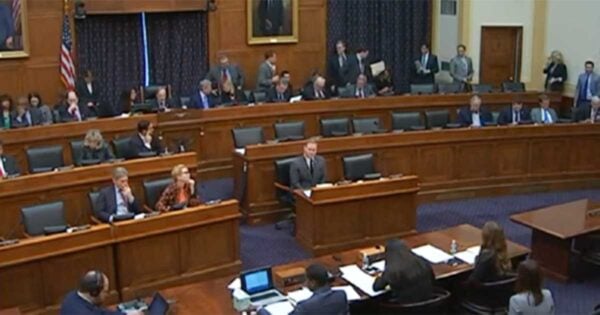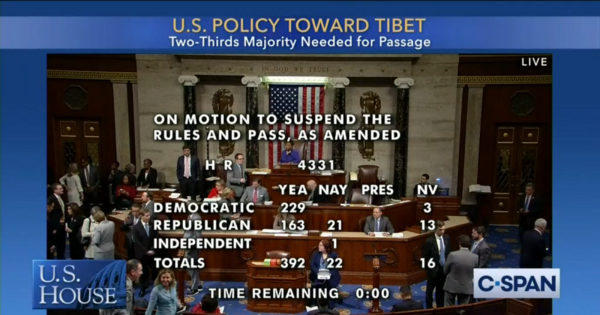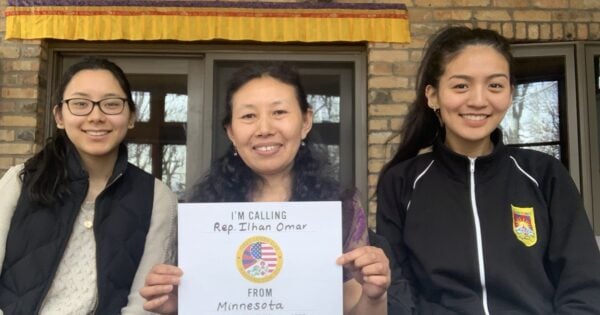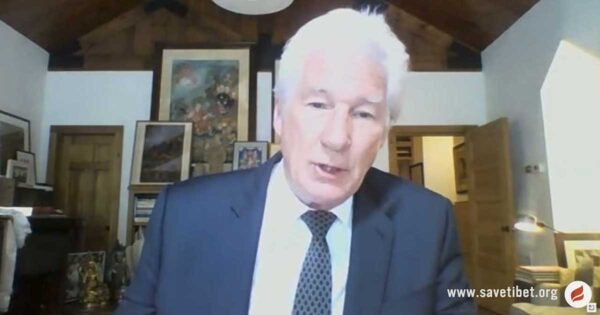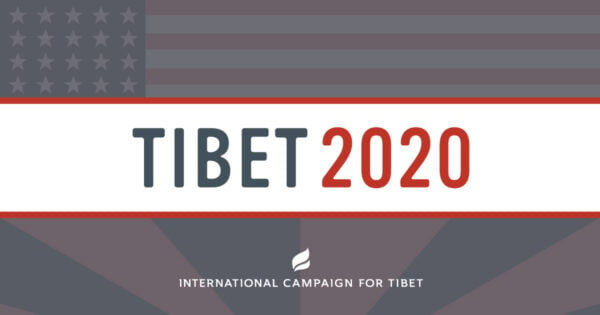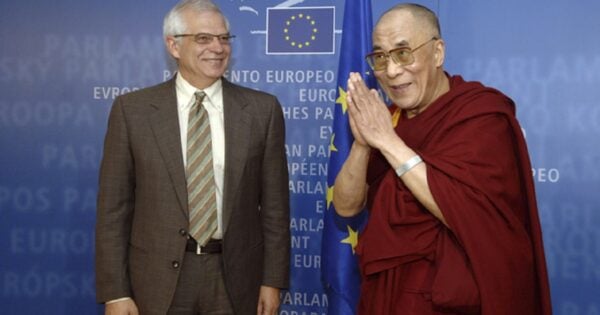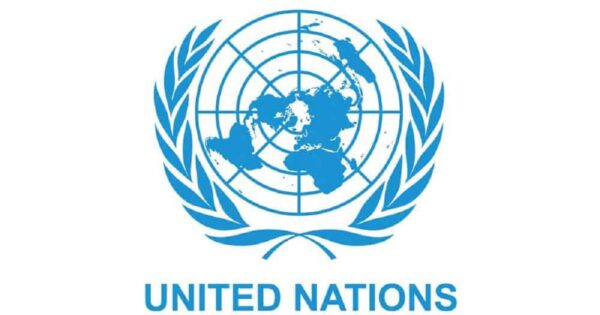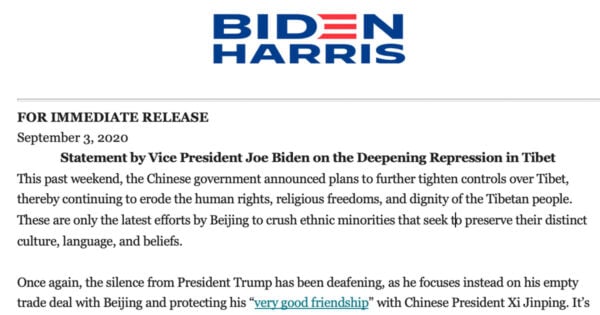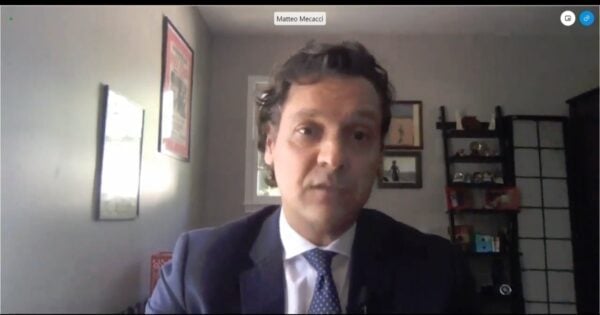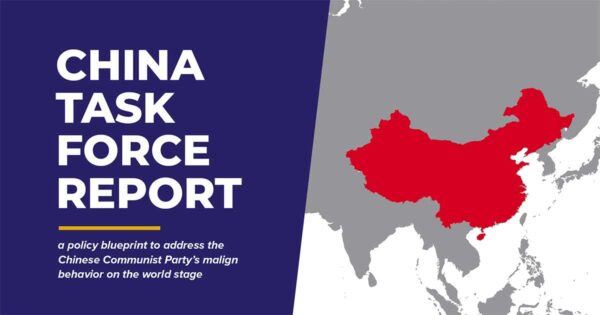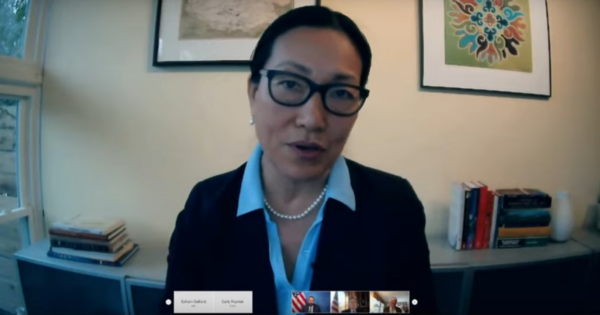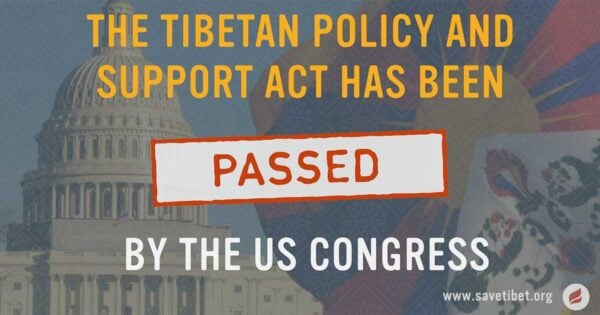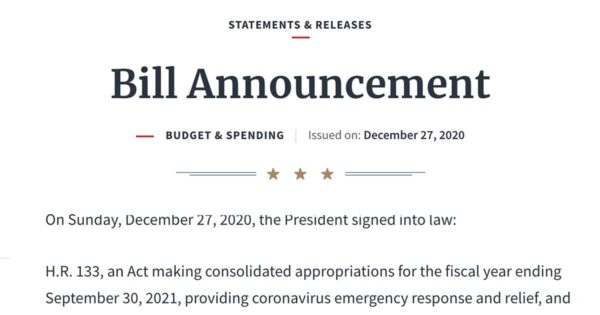The Tibetan Policy and Support Act: How a bill becomes a law
When the US Congress passed the Tibetan Policy and Support Act on Dec. 21, it advanced the legislation just in time for the president to sign the bill into law before 2020 ends.
But the TPSA’s journey to overhauling US policy on Tibet has taken over a year and a half and required lots of work behind the scenes in the past many years.
The Tibetan Policy and Support Act: How a bill becomes a law
When the US Congress passed the Tibetan Policy and Support Act on Dec. 21, it advanced the legislation just in time for the president to sign the bill into law before 2020 ends.
But the TPSA’s journey to overhauling US policy on Tibet has taken over a year and a half and required lots of work behind the scenes in the past many years.
Cool Timeline
From its headquarters in Washington, DC, the International Campaign for Tibet had helped lead the advocacy push for the Tibetan Policy Act of 2002, the most important law laying out US policy on Tibet.
Almost a decade later, ICT informed the Central Tibetan Administration—which is based in Dharamsala, India and provides democratic representation in exile for the Tibetan people—that it was seeking to update the Tibetan Policy Act. ICT stayed in contact with the CTA on further developments thereafter.
In his testimony at a House Foreign Affairs Committee hearing, ICT Vice President Bhuchung K. Tsering made the following recommendation: “The Tibetan Policy Act of 2002 is a comprehensive and pragmatic expression of congressional support for the Tibetan people. We urge the committee to explore further ways to strengthen the Act to take into account new developments in Tibetan politics, including development inside Tibet.
“Given Congress’ longstanding promotion of international religious freedom, the committee should explore whether the Tibetan Policy Act can be used to clarify US policy on the succession or reincarnation of the Dalai Lama and issues that might have much consequences in the coming period. That act can also be updated to include legislature authorization and policy guidance for assistance for Tibetan refugee settlements.”
Tibetan Americans and Tibet supporters from across the United States visited the US Congress for the fourth annual Tibet Lobby Day, which ICT coordinated. Included among the participants’ asks to members of Congress was the following:
“Update the Tibetan Policy Act of 2002 to respond to new developments in Tibet and within the Tibetan exile community.”
Over the years, ICT worked behind the scenes with Congressional offices on a draft of an amendment to the Tibetan Policy Act and the possibility of introducing such legislation.
ICT also consulted the Central Tibetan Administration through the Office of Tibet in Washington, DC.
Just two days after the Dalai Lama’s 80th birthday, members of the US House of Representatives passed House Resolution 337, titled, “Calling for substantive dialogue, without preconditions, in order to address Tibetan grievances and secure a negotiated agreement for the Tibetan people.”
Among other provisions, the resolution called on the US government to “underscore that government interference in the Tibetan reincarnation process is a violation of the internationally recognized right to religious freedom, and that matters related to reincarnations in Tibetan Buddhism are of keen interest to Tibetan Buddhist populations worldwide.”
March 10, 2018 was the 59th anniversary of the 1959 Tibetan Uprising. But thanks to Senate Resolution 429, which passed a few weeks later, the Senate recognized it as Tibetan Rights Day.
As part of the resolution, the Senate expressed its sense that the “identification and installation of Tibetan Buddhist religious leaders, including a future 15th Dalai Lama, is a matter that should be determined solely within the Tibetan Buddhist faith community, in accordance with the inalienable right to religious freedom.” And that “any attempt by the Government of the People’s Republic of China to identify or install its own candidate as a Tibetan Buddhist religious leader, including a future 15th Dalai Lama, is invalid interference in the right to religious freedom of Tibetan Buddhists around the world, including in Tibet as well as the United States and elsewhere.”
The idea for the TPSA began at a strategy session in Speaker Pelosi’s office in 2019. This photo is from another strategy session a year later with ICT international staff and board members, Tibetan leaders, the speaker and her bipartisan Congressional colleagues.
When the leaders of the International Campaign for Tibet worked with the office of House Speaker Nancy Pelosi, D-Calif., to hold the fifth annual strategy session for Tibet on Capitol Hill, they were riding a wave of momentum. At the end of 2018, Congress had passed the Reciprocal Access to Tibet Act, which took direct aim at China’s unfair policy of restricting Americans’ access to Tibet—which China annexed about 60 years earlier—even though Chinese citizens are free to travel throughout the US.
RATA was the most important Tibet-related legislation in more than a decade. But almost two decades had gone by since Congress passed the Tibetan Policy Act of 2002, the most important law establishing US policy on Tibet. It was time for an update. And at the meeting in Pelosi’s office, the attendees began to discuss a new bill that would dramatically increase US support for Tibetans, including on the crucial issue of protecting the Dalai Lama’s succession from interference by the Chinese government.
After their meeting with Pelosi and other Congressional leaders on Capitol Hill, ICT staff worked with the staff of Rep. James McGovern, D-Mass., to provide suggestions for the text of the new legislation.
McGovern was the chair of the Congressional-Executive Commission on China and one of the strongest supporters of the Tibetan people in Congress.
Thank you Tibetan Community of NY & NJ, @officeoftibet @SaveTibetOrg @reptomsuozzi for a productive Town Hall discussion about human rights in #Tibet! https://t.co/5GF4TbcIgE
— Rep. Jim McGovern (@RepMcGovern) July 22, 2019
McGovern and his fellow Congressional-Executive Commission on China member, Rep. Tom Suozzi, D-NY, traveled to a town hall hosted by the Tibetan Community of New York & New Jersey. There, they hinted at the legislation that was to come.
As recounted by the Office of Tibet, McGovern told the crowd of about 300 Tibetans that the commission planned to update the Tibetan Policy Act of 2002 with new provisions focused on the reincarnation of the Dalai Lama and the status of the Central Tibetan Administration, which provides democratic governance for Tibetans in exile. Representative Ngodup Tsering of the Office of Tibet and ICT President Matteo Mecacci also took part in the meeting, which McGovern later tweeted about.
After months of consultations, the bill arrived: Rep. McGovern introduced the new Tibetan Policy and Support Act in the House of Representatives. Labeled H.R.4331, the bill promised to make it official US policy that only the Dalai Lama and the Tibetan Buddhist community could decide on his eventual succession. If Chinese officials tried to name their own Dalai Lama in the future, the bill would sanction them.
The TPSA would also address climate change and water security in Tibet; prevent China from opening a new consulate in the US until it allowed a US consulate in the Tibetan capital of Lhasa; and expand the role of the special coordinator for Tibetan issues in the State Department, among other changes. Alongside McGovern, Reps. Marcy Kaptur, D-Ohio, Tom Malinowski, D-NJ, Ben McAdams, D-Utah, Mark Meadows, R-NC, Brad Sherman, D-Calif., Chris Smith, R-NJ, and Thomas Suozzi, D-NY, cosponsored the bipartisan bill.
Just a few days after its introduction in the House, the TPSA made its way to the Senate when Sen. Marco Rubio, R-Fla., introduced the legislation alongside Sens. Ben Cardin, D-Md., Tom Cotton, R-Ark., Dianne Feinstein, D-Calif., Lindsey Graham, R-SC, and Ed Markey, D-Mass.
Rubio, the co-chair of the Congressional-Executive Commission on China, described the TPSA as “much needed” amid “new challenges posed by the Chinese Communist Party against Tibetans.” “We must continue to shine a bright light on the Chinese government’s repression of the Tibetan people,” he said, “and explore new tools to protect their religion, language, and culture, both inside and outside China.”
One of the TPSA’s main areas of focus is the Dalai Lama. So it was only fitting when ICT President Matteo Mecacci hand delivered the bill to the Tibetan Buddhist leader at his exile home in Dharamsala, India.
Mecacci—who was leading a Senate staff delegation to Dharamsala with Sarah Arkin, deputy staff director of the Senate Foreign Relations Committee and Bethany Poulos, policy analyst in the office of Sen. Rubio—presented a copy of the legislation to the Dalai Lama. “We are making some progress in the US Congress in particular,” Mecacci explained to His Holiness. He added that ICT was also trying to advance similar legislation in Europe.
Although Tibetan Americans are a small community, they are devoted to the Tibetan cause. At ICT’s mini-Tibet Lobby Day, members of Tibetan associations around the country came out in force to visit the district offices of their senators and representatives to ask them to cosponsor the TPSA. In Washington, DC, Tibetan Americans and Tibet supporters joined ICT to meet with the offices of about 75 legislators on Capitol Hill.
These efforts appeared to bear fruit, as the TPSA quickly gained an additional seven cosponsors in the House and two new cosponsors in the Senate.
The TPSA would establish an official US policy that only the Dalai Lama and the Tibetan Buddhist community could decide his succession. But even as the bill worked its way through Congress, the US ambassador-at-large for international religious freedom made it clear what the US position already was.
Speaking at a Tibetan performing arts conference in Dharamsala, Ambassador Sam Brownback noted that the Tibetan community had recently passed a unanimous resolution stating that China had no right to interfere in the reincarnation of Tibetan Buddhist leaders. “Let me be clear,” Brownback said. “The United States shares that view. We believe that Tibetans, like all faith communities, must be able to practice their faith freely and select their leaders without interference.”
The speaker of the House, the sister of the Dalai Lama and the chairman of ICT sat on a stage together in San Francisco, telling the crowd of about 300—plus many more online—why Tibet matters in today’s world. Nancy Pelosi, Jetsun Pema and Richard Gere were the stars of ICT’s “Why Tibet Matters” event, which helped raise awareness through a discussion between two extraordinary women from different backgrounds, moderated by a world famous actor, social activist and philanthropist.
Toward the end of the discussion, Pelosi said the TPSA has “bipartisan support in both houses” of Congress, but warned that the Chinese government would “rear its head in Washington, DC” to try to stop the bill’s passage. Gere added that the TPSA was ICT’s “number one priority.” The Dalai Lama, he said, has “made it very, very clear, and he’s been steadfast, he will not be reborn in a Chinese-controlled area. So that’s it. Final.”
The 14th Tibetan Religious Conference in Dharamsala, India on Nov. 27, 2019. (Photo: Tenzin Phende/CTA)
The 14th Tibetan Religious Conference in Dharamsala brought together the heads of the different Tibetan Buddhist traditions and the Tibetan Bon religion, plus other eminent lamas and religious figures. They passed a resolution stating that the Dalai Lama’s reincarnation was solely up to him to decide. “If the Government of the People’s Republic of China for political ends chooses a candidate for the Dalai Lama,” the resolution said, “the Tibetan people will not recognize and respect that candidate.”
The resolution also urged the Dalai Lama to reincarnate, saying all Tibetans wished for him to do so. In 2011, the Dalai Lama had laid out his views on his succession in a statement declaring that Tibetans and Tibetan Buddhists should decide whether or not to continue the institution of the Dalai Lama after he died.
The TPSA was on the fast track to passing the House. The House Foreign Affairs Committee approved the bill unanimously at a markup hearing, clearing the way for it to get a vote on the House floor.
“With this bill, we send a clear message: If Chinese officials infringe on the religious freedom of the Tibetan people, we will hold them accountable,” Committee Chairman Eliot Engel, D-NY, said. Rep. Chris Smith, R-NJ, added that, “The policies of the Chinese government have severely degraded Tibetan religion and culture, language, livelihood and the natural environment.”
For supporters of Tibet, the new year got off to the perfect start. The House voted to pass the TPSA by an overwhelming margin, advancing it out of the chamber just four months after its introduction. The success of the bill was aided by ICT members, who sent more than 12,000 messages to their members of Congress, asking them to support the legislation.
With this vote, the TPSA was now halfway through Congress. But with the chaos of 2020 only just beginning, moving the bill through the other half was going to take a much longer effort.
While attention shifted to the US Senate, countries in Europe began to speak out against China’s interference in the Dalai Lama’s succession. In Germany, Niels Annen, minister of state at the Federal Foreign Office, responded to a question from Member of Parliament Margarete Bause by saying that, “The Federal Government is of the opinion that religious communities may regulate their affairs autonomously.” Annen added: “This includes the right to determine their religious leaders themselves.”
Earlier, Belgian Foreign Affairs and Defense Minister Philippe Goffin had said, “It is logically up to the Tibetan religious community to designate [the Dalai Lama’s] successor without interference from the temporal authorities.” And Dutch Foreign Affairs Minister Stef Blok declared that, “The position of this cabinet is that it is up to the Tibetan religious community itself to appoint a future successor to the Dalai Lama.”
Members of our board and international staff met w/ @SpeakerPelosi in the US Capitol this week to discuss the situation in #Tibet! The Representative of the #DalaiLama @NgodupTsering7 and Professor Lobsang Negi of @EmoryUniversity were also present (Photo: Office of the Speaker) pic.twitter.com/U2LheZAK6u
— International Campaign for Tibet (@SaveTibetOrg) March 6, 2020
In the year since the previous strategy session in Speaker Pelosi’s office, the TPSA had gone from a mere idea to a robust bill passed by the House. So when Pelosi again hosted ICT leaders and a bipartisan group of Congress members, they strategized how to build on the bill’s success.
This time, the meeting included ICT staff from Europe, as well as Ngodup Tsering, representative of His Holiness the Dalai Lama to North America, and Professor Geshe Lobsang Tenzin Negi of Emory University.
The coronavirus was shutting down the United States and the world. But the Chinese government was only increasing its repression inside Tibet. Even under the challenging circumstances of a global health crisis, advocacy for Tibetans had to go on. So ICT announced that its annual Tibet Lobby Day would take place virtually.
To ensure that Tibetan Americans and Tibet supporters took part in the event, McGovern and Rubio sent them video messages. In his video, McGovern talked about the House passing the TPSA a few weeks earlier. “Now it’s time to get the bill passed in the Senate. And that’s why we need your help on Tibet Lobby Day,” he said. Rubio added: “I just want to thank you for your advocacy in support of the Tibetan people and in support of this very important piece of legislation.”
The first virtual Tibet Lobby Day was a success. With Capitol Hill closed to the public, more than 150 ICT members and supporters of Tibet from across the United States called more than 80 Congressional offices to speak with members of Congress and their staff.
One of the callers’ main requests was for the Senate to pass the Tibetan Policy and Support Act. The participants also shared images on social media of them calling Congress from the safety of their own homes.
With COVID-19 continuing to make in-person gatherings impossible, ICT turned its Tibetan Youth Leadership Program into a virtual event featuring a discussion between McGovern, Brownback and young Tibetan Americans. The program streamed live as part of Tibet Talks, ICT’s new online discussion series launched during the pandemic.
During the event, McGovern told the youths their advocacy was making a difference, and that he expected the TPSA to pass before the end of 2020. “I am very hopeful that we will get this through the entire process this year,” he said. Brownback added that the State Department viewed Tibet legislation as “very helpful.”
Richard Gere, the world-famous actor, social activist and philanthropist, has been the chairman of ICT for 25 years. He was one of four witnesses to testify at the “Censorship as a Non-Tariff Barrier to Trade” hearing of the Senate Finance Committee’s Subcommittee on International Trade, Customs, and Global Competitiveness—and he took the opportunity to urge support for the TPSA.
Gere asked the members of the subcommittee to cosponsor the TPSA and raise it with Senate leadership for swift passage. The Dalai Lama’s succession “can’t be allowed to be controlled by the Communist Party, but only by Tibetan Buddhists,” Gere told the senators. “I’m sure that you support this basic principle, and I ask you to cosponsor this bill.”
The introduction of the TPSA and its passage in the House was part of a banner year for support of Tibet in the United States. But the presidential election was fast approaching, and Americans were debating intensely over which direction the country should take. To make sure the suffering of the Tibetan people stayed on the agenda no matter who was president the next four years, ICT launched its Tibet 2020 campaign to inform the candidates why Tibet mattered.
As part of the campaign, ICT members and other supporters of Tibet sent petitions to the Democratic and Republican parties, urging them to take action for Tibet. Their list of requests included asking both parties to include Tibetans’ religious freedom in their official platforms.
“The selection of religious leaders should happen without any government interference and in respect of religious norms.” So said the European Union’s foreign policy chief, Josep Borrell, adding that, “In the framework of the EU-China Human Rights Dialogue, the European External Action Service has repeatedly expressed the position that China needed to respect the succession process of the Dalai Lama.”
Borrell, the EU’s high representative of the union for foreign affairs, was answering a parliamentary question tabled earlier in the year by a group of five members of the European Parliament from four political factions.
In 1995, the Dalai Lama recognized Gedhun Choekyi Nyima, a six-year-old living inside Tibet, as the reincarnation of the Panchen Lama, one of the most important Tibetan Buddhist leaders. Three days later, the Chinese government kidnapped the child and his family; none of them have been seen in public since. In Nyima’s place, China appointed its own, fake Panchen Lama, who now serves as a mouthpiece for the Chinese Communist Party.
Fears are high that China will follow a similar pattern when the Dalai Lama eventually dies. So it was significant that five UN human rights experts and expert bodies wrote to the Chinese government to “express grave concern at the continued refusal by the Government of China to disclose precisely the whereabouts of Gedhun Choekyi Nyima.” The experts appealed to China “to ensure that Tibetan Buddhists are able to freely practice their religion,” noting that Tibetans’ religious freedom included the right “to determine their clergy and religious leaders in accordance with their own religious traditions and practices.”
ICT’s leadership, including ICT’s Chairman Richard Gere, had met with the UN High Commissioner for Human Rights in 2017 and raised a number of human rights violations with his office and those of key UN Special Rapporteurs. Kai Mueller, head of ICT’s UN Advocacy Team, has for years coordinated ICT’s work at the UN with such concrete results as the above mentioned.
With the 2020 presidential election down to the home stretch, Democratic nominee Joe Biden released a strong statement pledging that “a Biden-Harris administration will stand up for the people of Tibet.” Although the statement did not explicitly mention the TPSA, Biden did promise to meet with the Dalai Lama and railed against China’s erosion of Tibetans’ religious freedoms.
Earlier in the election cycle, the Republican Party’s national platform had said “cultural genocide” was taking place in Tibet.
The Congressional-Executive Commission on China’s hearing on “The Human Rights Situation in Tibet and the International Response” was another sign of Congress’ growing concerns about Tibet. And in his remarks, ICT President Matteo Mecacci laid out the US government’s growing actions to help Tibetans, from the State Department implementing the Reciprocal Access to Tibet Act in July 2020 to the House passing the TPSA in January.
Mecacci said the Senate passing the TPSA “will be a powerful message of hope to the Tibetan people who are otherwise faced with daily oppressive policies by the Chinese authorities.” He added that China’s plan to select the next Dalai Lama was “an absurd claim that the international community needs to challenge decisively.”
The House China Task Force report chronicled some of China’s outrageous human rights violations in Tibet, as well as its efforts to silence support for Tibet in the United States and intimidate Tibetan American communities.
In its list of recommendations, the task force report said Congress “should ensure final passage” of the TPSA. The report noted that the TPSA was a “bipartisan measure.” ICT has been in touch with the task force on issues related to Tibet.
House Resolution 697 promoted autonomy for the Tibetan people and offered them support on a number of issues. For one thing, it urged “the swift enactment” of the TPSA “to update United States policy toward Tibet, particularly on issues related to the succession or reincarnation of the Dalai Lama, water security and environmental concerns in the Tibetan plateau, and support for the Tibetan community, language, culture, and religion.”
The resolution passed by voice vote on the floor of the House after the House Foreign Affairs Committee approved it at a meeting on Oct. 1. Reps. Ted Yoho, R-Fla., Michael McCaul, R-Texas, James McGovern, D-Mass., and Chris Smith, R-NJ, introduced the bipartisan resolution in late 2019.
While the clock ticked down on the TPSA’s passage, the US was making its resistance to China’s interference in the succession of the Dalai Lama even more apparent. Ambassador Andrew Bremberg, permanent representative of the United States of America to the Office of the United Nations and other international organizations in Geneva, hosted a US Mission in Geneva event on “Religious Freedom in Tibet: The Appointment of Buddhist Leaders and the Succession of the Dalai Lama.”
The US ambassador-at-large for international religious freedom, the president of the Central Tibetan Administration and the special coordinator for Tibetan issues in the State Department all took part in the event. So did ICT’s Director of Outreach Tencho Gyatso, who said, “As a representative of the International Campaign for Tibet, I call on you all to put the question of religious freedom and the succession of His Holiness the Dalai Lama at the top of your human rights agenda in all your relationships with the People’s Republic of China.”
Jurisdiction over the TPSA had moved to the Senate Foreign Relations Committee. But in the run-up to the election, the committee had not convened any business meetings to pass legislation. So ICT members kept sending petitions to the committee leaders, urging them to take up the TPSA. In the end, ICT members and other Tibet supporters sent a total of 26,423 petitions to Congress in support of the TPSA.
ICT staff, especially President Matteo Mecacci, kept meeting with key House and Senate staffers to push for the bill. Ultimately, House and Senate leaders agreed to attach the TPSA to a government spending bill, so that the overwhelming support for the measures contained in the TPSA would not go to waste.
Time had nearly run out on the TPSA. If Congress didn’t pass the bill before the year ended, it would have to start all over again in 2021. All of the previous votes and actions that Congress had already taken on the bill would be for naught.
Thankfully, just days before Christmas, the House and Senate both finally passed the TPSA as part of a government spending package. President Trump was expected to sign the legislation into law immediately thereafter. The TPSA’s long journey had at last come to fruition, and a new era in US support for Tibet was about to begin.
President Trump signed into law H.R. 133, the Consolidated Appropriations Act, 2021, which included the Tibetan Policy and Support Act of 2020.
With this, the TPSA officially became the law of the land in the United States.


